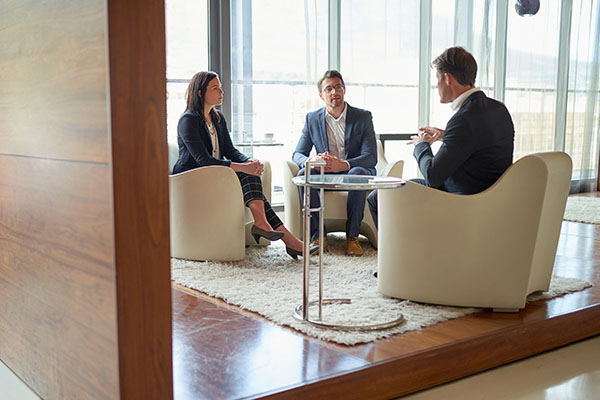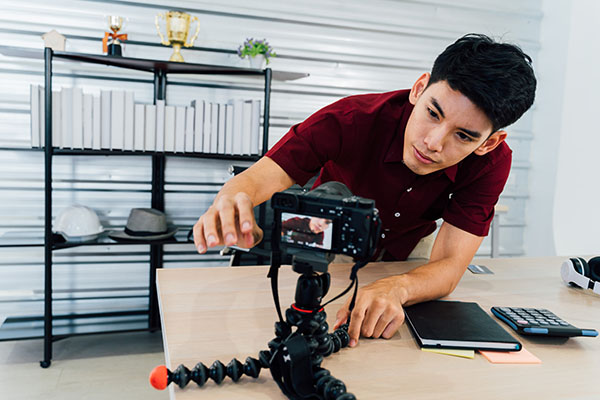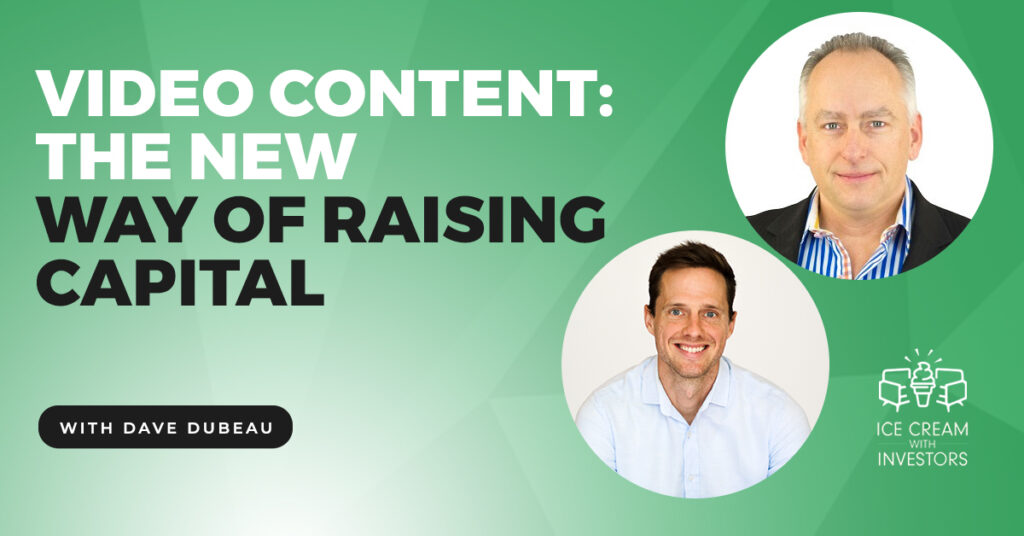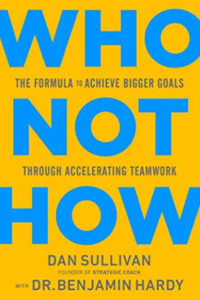Capital raising has changed over time, and one of the emerging new trends is the idea of video content. The majority of people are going to be on their phones watching YouTube, so you might as well utilize that. You have to evolve with change, and video is the way to the future. Join Matt Fore as he talks to the creator of the Money Partner Formula, Dave Dubeau. Learn how you can raise capital just like how Dave raises capital for mom-and-pop real estate investors. Discover the power of video marketing and testimonials so you can really find success. Go out and get those testimonials right now!
—
Watch the episode here
Listen to the podcast here
Video Content: The New Way Of Raising Capital With Dave Dubeau
Dave, welcome to the show.
It’s great to be here. Thanks for having me on.
We like to start with the difficult questions here. What’s your favorite ice cream?
It’s Tiger Stripe, which blows my mind because I hate black licorice. If you’re not familiar with what Tiger Stripe is, it’s orange ice cream and black licorice ice cream twirled together. I hate black licorice. However, I love Tiger Stripe ice cream. I don’t know why.
I have to say, out of 150 episodes, that’s probably the most unique answer I’ve heard so far.
There you go.
Tell our audience what the scoop is. What do you do?
My gig is I am a passive real estate investor and a very active consultant for mom-and-pop real estate investors. We help them get started with raising private capital by leveraging their existing networks. That’s what we do. We provide done-for-you marketing services, processes, and things like that for mom-and-pop real estate investors.
That’s the end of where you are, but your journey is super interesting. Can you take us back to where your real estate journey began?
Yeah. I grew up around real estate. I didn’t realize it. For quite a few years, the family home was one unit in a six-plex that my father and my grandfather built. When I was a kid, when my mom and dad split up, unfortunately, my mom became a very active real estate investor way back in the late ‘70s and early ‘80s. She built up a portfolio of over 50 rental units while working full-time and as a single mom. That was pretty impressive, although I didn’t clue into that at the time.
When I got into it, it was when I was living in San Jose, Costa Rica of all places. I traveled and lived in Latin America for almost fourteen years. Ten of those years were in Costa Rica. I had a language training company down there. I got married and had kids. I was living in Costa Rica and stumbled across some real estate opportunities we would call pre-foreclosure type deals. I got involved in a couple of those. I didn’t have a clue what I was doing. I put some money in. Other people took care of most of the heavy lifting. I made a good return on that, and that piqued my interest.
In 2003, I packed up my Costa Rican family, my Costa Rican wife and our two little kids, and hauled them all back to the frozen hinterlands of Canada, where I’m from and where I’m based. It is beautiful British Columbia. To say that was a shock to their system is an understatement. People, especially Canadians, will go, “The frozen hinterland of Canada and tropical Paradise of Costa Rica. What the heck were you thinking? Why would you ever come back?” You don’t realize what you’ve got until you leave it for a while.
As great as Costa Rica is, being the pasty-faced White dude that I am, whether you got much money or not, people assume that you do. There’s a bit of a target on your back, on your family’s back, and that sort of thing. There is a risk of getting kidnapped and held for ransom. It doesn’t happen often, but I do know three people it has happened to down there. However, I don’t know anybody where I live in Kamloops that has ever been kidnapped, held for ransom, or anything like that.
We moved the family and I had to start all over again from scratch. I hadn’t been able to sell my business. I didn’t have much in the way of savings. I’d been out of the country for so long. I had no credit. I had pretty much zero employment prospects. I saw one of those late-night infomercials that said, “Do you want to get into real estate with little or no money down?” I said, “Yeah, because that’s what I got.”
I sent away for one of those home study courses. That’s the guy with the babes in bikinis on yachts, boats, and all that crap. I sent away for this home study program. This is so long ago. This is way before your day. It came in binders with CDs. There was maybe a VHS cassette or two in there. That’s what I got. I was under a crunch, so I applied myself.
I started doing deals fairly quickly. I did 18 deals in my first 18 months. That’s how I got started with real estate investing. That sounds impressive, but they’re not the kind of deals that you guys are doing. We’re not talking about big multifamily deals. We’re talking creative, low-money down type deals. Mobile homes in mobile home parks were a significant chunk of those deals. It was rent-to-own deals, lease options, and these kinds of things. That’s what I was doing for a while.
I want to ask a question about your mom because building a single-family portfolio in the ‘70s as a female, single mom, and all that stuff is super impressive. If you did it, it would be super impressive. Where did that drive come from? Where did the knowledge come from? Why do you think she was doing that?
I was such a ditz that I didn’t pay much attention to it at the time cause I was a kid. I was a kid, then a teenager. I was completely self-centered. It was something my mom was doing. I do remember vividly, though, in the early ‘80s when it all came crashing down when interest rates went up. I had Deja Vu a little bit there, but they didn’t go up to 4.5%, 5%, or 6%. They went up to 18%, 19%, and 20% back in those days. Everything came crashing down for her, unfortunately.
What inspired her? What motivated her? She bumbled into getting her first rental property, got a taste of cashflow, and liked it. I can still remember her being up late at night crunching numbers, doing her books, and all that stuff. She seemed to enjoy that stuff. She liked that and was looking for a secondary income source for retirement.
You mentioned 18 deals in 18 months. Every real estate investor comes to that crossroads where they need to raise capital because they have extended their money as far as it would go. Is that what happened to you at that point? When did you decide to make the pivot to start raising private capital?
No, it didn’t happen then because my whole focus at that point had been getting into wonky deals and people in wonky situations where I didn’t have to come up with much cash or any credit to get involved in the property. It was all creative financing and no-money-down type stuff. It wasn’t then. It was a few years later. I took a hiatus from actively investing in real estate.
I jumped back in a few years later and got into a strategy that involved buying single-family homes and then renting them out, doing a lease option type of deal with those. By that time, I had good credit and some cash, so I was able to self-finance my first couple of properties. That’s when I ran out of cash and credit. I hit the wall. That’s when this “perfect deal” landed on my lap. It was when I didn’t have the money to do it.
I had been listening to all these real estate gurus. It was before podcasts and whatnot. It was at the seminars and stuff. Everybody was always saying, “Go find a good deal and the money will find you.” I said, “That sounds great.” It makes sense. You got a good deal. Who can refuse? I had this good deal, and then I started scrambling. I tried to figure out how to raise the capital. I only had two weeks to come up with the money to remove subjects for financing. I tried everything that I thought other people were doing successfully.
If you heard the quote, ‘Go and find a good deal and the money will find you’, that isn’t true.CLICK TO TWEET
You come from a sales background. You’re probably accustomed to or comfortable with the idea of picking up the phone and dialing for dollars. I don’t come from that background. I’d never done that before. I saw a movie, like Wolf of Wall Street or something like that. That damn Leonardo DiCaprio made it look fun. He is dialing for dollars, getting people to spend gazillions of dollars. I tried that and all I got was rejection. It was not interest but rejection. I’d love to say I grounded out and kept going, but I didn’t. I did that about a dozen times and then started pouting. I said, “I don’t want to do this anymore,” and quit calling. I was thinking, “What else can I do?”
I’d also heard people say, “If you need to raise money, go out and network up a storm. Turn every conversation into real estate conversation.” I was like, “I’ll try doing that.” That’s what I did. I tried networking and schmoozing. I raised zero capital because desperation oozed out of every pore in my body. It wasn’t even that much money. I only needed to raise $85,000. When you’re going to a stranger and saying, “I got the deals. Have you got the dough?” and they don’t know you, like you, or trust you, why the heck are they going to invest with you? That didn’t work.

Raising Capital: If you’re oozing desperation in every pour of your body, no one will want to give you money. If a stranger doesn’t feel like they can trust you, they won’t invest with you.
I spammed everybody I knew with my deal. That didn’t work. In fact, all I did was turn off a lot of good prospective investors. I ended up having to lose that deal, which was painful at the time, but a good experience. That’s when the smoke cleared. I sat down and said, “That sucks.” Have you ever tried something that appears like other people are having success at, but it doesn’t feel right or doesn’t fit your personality? Have you ever tried anything like that?
Plenty.
That’s what I was doing there. I sat down when the smoke cleared and said, “There’s got to be a different way. This doesn’t fit into my wheelhouse. I’m not comfortable trying to become good at this stuff that I don’t like doing. Why don’t I try something I am good at?” I have a background in marketing. I said, “Why don’t I apply marketing to this whole raising capital thing?” By hooking my crook, I came up with what I call my Money Partner Formula. It worked well for me.
I raised under $1 million for single-family home deals and started getting into multifamily deals. It was not as big as what you guys are doing, but some larger type deals. I raised several millions of dollars for deals I’ve been involved in. Over the years, I’ve been working with other mom-and-pop real estate investors. We’ve helped them cumulatively raise somewhere around $300 million to $350 million for their deals following the process.
I’m hearing from this conversation, too, and I’ve heard from you speaking in the past that the best time to dig a well is when you’re not thirsty. It’s around priming people in your network that, “This is what I do.” You hear everybody say, “Go tell everybody you do real estate.” That is a 6 to 12 to 18-month play. They’re not telling you to go do that when you have an active deal under contract. If you have the deal, the money will come maybe in certain situations, but it’s better to dig that well than wait until you have that deal.
I’d like to find out who said that first and smack them upside the head.
You have the five-step formula that you’ve covered on a number of different shows. I think I heard you pitched that on a show back in 2017, so it’s very well-established. You’ve helped a lot of investors do that. You’ve also seen this capital-raising industry change over time as well. One of the things we were specifically talking about is the idea of video and video form content. How have you seen video be introduced into the capital raising process? How has it helped or maybe not helped the process?
We’ve been doing video since day one. The reason video is good is because that is the way most people prefer to consume information. The reality is if you take a look at the library and how many people are in there versus how many people are watching stuff on YouTube and Netflix, YouTube and Netflix have got it. Especially with social media, TikToks, reels, and all this stuff, video is the preferred way for the vast majority of people to consume their information. We can either fight against that and say, “We wish it weren’t so,” or we can work with it.

Raising Capital: Video as a marketing tool is good because that is the way most people prefer to consume information. Just compare how many people are at a library versus how many people are watching YouTube.
What we do and what I recommend real estate investors do is that they add in video as part of their marketing mix. We always talk about getting people’s attention, getting top of mind, and staying top of mind with your prospective investors using a variety of different mechanisms and methods. Video is one of the ones that we find works the best.
You mentioned introducing video into the process. There are probably a lot of people out there that hear that and are a little nervous about it. They’re like, “I don’t look good on camera. I don’t like the way I look. I don’t sound great,” etc. How do you help people overcome the internal hurdles they’re facing?
It doesn’t matter. Here’s what I do to help my clients. Everybody’s nervous about this if you haven’t done it before. I remind people that you’re doing a video. Ideally, a lot of people are going to see that video, but here’s a big difference. Most people have in their minds that if they do a video, it’s as if they’re going to be in a movie. In their minds, they think of going to a movie theater, seeing themselves up on the big screen with a couple of hundred people around them, and everybody’s watching them giggling, snickering, and pointing at them. That’s not how it works.
Think about how you typically consume videos that you see on YouTube, TikTok, or wherever. Chances are you are by yourself watching something on your phone, laptop, or TV. Chances are that’s how you’re consuming it. When I’m coaching people around this, I say, “Do the video as if you’re talking to one person. That’s all the number of people that are going to be watching it at any one time.”
Do it as if you’re talking to one person. Be yourself. Don’t try to be a fake version of yourself. Maybe be a little bit more enthusiastic and kick it up a notch, but you don’t have to try to be somebody else. You don’t have to go get massive training around this. Be yourself. Talk as if you’re talking to one person. Have an image in your mind that that person is an old friend of yours. You’re having a conversation with one person who already knows you. Is that helpful?
Yeah. I would say a couple of things about this. One, the beauty is in the edit. When you’re watching that Avatar film online or in the movie theater, there’s a ton of editing that goes into that. There’s a ton of editing in what we do. One of the best pieces of advice I got when I was starting out was to take it one line at a time and then let the editor do what they do, which is mash it all together.
The second thing I would say is that one thing that’s helped me, too, is having a conversation with someone before I shoot a video on something I’m passionate about. What you find is that level of energy naturally expands. The voice naturally gets a little bit louder. You get excited and you’re used to talking. If you roll out of bed at 3:00 AM, flip on the lights, turn on Zoom, and start recording, it’s probably not going to be your best bet. If I get out of a good, engaging conversation like we’re having, and then I go try to shoot something, chances are it’s going to be a little bit better. Those are a couple of quick tips I give.
I’m going to be cranking out twenty YouTube videos. That’s good advice. I’ll try and have an enthusiastic conversation before I go through that eight-hour marathon.
Another thing that I was super interested in picking your brain on is the idea of testimonials. You’ve worked with a ton of different investors out there who are raising capital. Testimonials, for me, have been very powerful for our business. The fact that Dave knows a direct testimonial that he can refer to us, but I’ve never understood a straight blanket testimonial of someone that doesn’t know Dave and heard him explain the experience. Can you talk to us about what has been your experience with testimonials?
First of all, I might not have understood what you meant by the last part of the question. Are you saying that if somebody sees a testimonial from someone they don’t know, what difference will that make?
That’s right.
I get it. Here’s my take on it, and let me know what you think about this as well because you’ve gotten a lot of testimonials. You and I can stand up and talk about how great we are until we’re blue in the face. I can say, “I’ve done this. I’ve done that. I’m so great.” A lot of people do. Quite frankly, it comes off as obnoxious and self-promoting. People see through that stuff. On the other hand, if somebody else says nice things about you, that’s going to carry a lot more weight, even if that person is unknown to the viewer.
If somebody says nice things about you, that’s going to carry a lot more weight than you self-promoting yourself.CLICK TO TWEET
It’s pretty easy to spot a fake testimonial. The kind of testimonials I like to do are like this. If you’re reading this, you can’t see it, but Matt and I are on Zoom. We’re two talking heads beside each other and we’re having a conversation. When I’m getting testimonials, typically, it’s on Zoom and it’s conversational. I’m using that as a testimonial. Not only can the viewer see the person who’s speaking and giving the testimonial, but they see my smiling ugly mug right beside them. There’s that connection. It’s a lot harder to fake that kind of stuff. Does that make sense?
Absolutely. I never even thought about it that way. When I think of testimonials, I go to JPMorgan’s website. They’ve got some random White dude up there giving a testimonial about what JPMorgan is about.
That’s John M. from wherever. Miami says J.P. Morgan’s fantastic. Who’s going to believe that? That’s why there are testimonials. Would you like me to share with you and the audience how we go about getting testimonials and how we get our clients to get their own testimonials?
Please, because you’re shifting my mindset on this.
This might be helpful for you. Give or take, in any particular quarter, how many investor meetings do you think you are having with investors? Do you have regular check-ins with your investors on a quarterly, semi-annual, or annual basis?
Yeah, probably about 50 of touch base. We’re like, “How are things going? What are your goals?” etc.
That’s perfect. That’s a good time to do this. How do you do these calls? Are they on the phone or on Zoom?
It’s mostly on Zoom. To your point, people want to see your face.
Especially if they got $150,000 or $300,000 invested with you, they want to see your beady eyes. Let’s say you’ve got a $300,000 doctor investor on board. I know you have got a lot of those folks on as investor partners. You’re having that quarterly check-in or semi-annual check-in with a person. Perhaps, these are the best times to get good testimonials. It is after a positive experience. Ideally, you’re having these conversations after you’ve sent them a big fat check, after they’ve got a disbursement, or you’ve cashed them out of the deal, or whatever. Something’s happened that they’re on a high note. Does that make sense?
The best time to get good testimonials is after a positive experience.CLICK TO TWEET
Yes.
It could be even when you started the deal. Whatever it is. Let’s say you’ve done a regular disbursement. They’re happy. Things are going along according to plan. That’s the perfect time to have these kinds of meetings. If you’re jumping on Zoom, you click Record. It’s for legal purposes. It’s to cover your butt. You’ve got it up on the Cloud. That’s part of your whole process. You record everything that you do. People are accustomed to that. They have to click the big blue button that they agree to be recorded, and then you’re having a conversation. Let’s say you are my investor. You’re involved in a syndication deal or whatever it is with me. I might be saying, “We sent you your most recent disbursement. Did you get that?”
I’d be like, “Yes.”
I’ll say, “That’s fantastic. Was it as much as you were expecting or was it a bit more than they were expecting?”
I’d be like, “It was more.”
I’ll say, “That’s fantastic. How do you feel about the investment so far?”
I’d be like, “I like it.”
I’m trying to ask a little bit more open-ended questions. I’m like, “How does this compare to some of the other investments that you’ve done in the past? I recall that you were heavily invested in mutual funds before. How does this investment compare to other things that you’ve done?”
I’ll say, “I was super transparent. I never know when I’m getting charged on a mutual fund. I never received the dividend checks. Where do those even go? You charge me 5% to sell me the mutual fund. It’s a lot better.”
I’ll say, “What do you like about this compared to that?”
I’d be like, “Cashflow, tax benefits, and you sent me a big, fat check of $300,000 at the end of it.”
I’ll say, “That’s fantastic. I know you were a little bit nervous. You hadn’t done a syndication deal before you got involved in this one. You’re a little bit hesitant about that. How do you feel about it? How has your mind shifted at all?”
I’d be like, “Through the transparency and the ability to see things on the portal, I feel much better about doing investments in the future.”
I’ll say, “That’s fantastic. If somebody that you know is thinking about getting in this kind of investment, what would you tell them?”
I would say, “Stop waiting. Do it now.”
You’re helping me along here, but there are some fantastic little sound bites in that conversation. We would wrap things up. I finished doing whatever it was I needed to do with Matt on that call. Towards the end, I’d say, “We had a good conversation there. Would it be all right with you if I use some parts of that as a video testimonial? I’ll put it together and I’ll send it to you and make sure you’re happy with it. Would that be all right with you?”
I’ll say, “Of course.”
You’re very cooperative. Some people might not be as happy about the idea of having a video testimonial as others. Most people will say that, and that’s cool. In which case, you go in and I would tighten that write-up. There was a lot of back and forth. That’s where the editing comes in. I would create what could even be a 15 to 20-second little testimonial snippet there. There’s me and Matt, and we’ve got that snippet there.
I’d get Matt’s approval on that, and then I would put that up on my website. I would have that in my marketing. I would create marketing around that. I use that as a case study. There are all sorts of stuff that we can do there. If Matt’s shy and doesn’t like the idea of being on video, give me a little pushback there when I asked for the favor.
I’d say, “I didn’t do my hair this morning. I’m not catching my good side.”
That’s fair enough. How about we do this instead? Would it be okay if I took some of what you said, created a written testimonial, used that, and said, “Here’s what I’ll do. I don’t want to put you into a lot of effort here. I’ll put it together. I’ll write down what I understood you say and I’ll send it to you. If it looks okay, that’s great. If you need to modify it, tweak it, or whatever you want to do, that’s fine, too. Would that work for you?”
I’d say, “I like it.”
That is perfect. If they don’t do the video, then they might do the written one. In either case, you might want to do both. That is a double whammy. You got the video up there and then you’ve got the written version underneath it with the person’s name. Some people will click on the video and listen to it. Other people can get a little snapshot of what was said there. Either way, you’re getting a double whammy with that testimonial.
You’ve changed my mind on that because when I think of testimonials, I’m thinking generic. You don’t know who the person is. Matt F. in Miami, you should use JPMorgan. This is a lot more personable. To your point, people watch videos and engage with videos a lot more.
You can still be Matt F. from whatever city. The fact that it’s you and I talking is going to have so much more of an impact than those crappy generic testimonials that we always see.
Our audience is seeing, too, to always be willing to change your mind on something. When we first were talking about this, I was like, “I don’t think that I would be involved in testimonials or I could do that,” but I completely understand that you’re spinning it a little bit differently.
Here’s the other thing that’s interesting. The fact that your investor has given you a testimonial increases the likelihood of them reinvesting with you and referring you exponentially. It’s self-serving in so many ways. Plus, quite frankly, a lot of people like seeing their faces up online and getting a little part of their fifteen minutes of fame thing. It’s a win-win all the way around.

Raising Capital: If one of your investors has given you a testimonial, chances are the likelihood of them reinvesting with you and referring you is exponential. Testimonials are self-serving in so many ways.
One thing we always do during the sales process is to make sure people feel like they’re a part of the sales process, too. They’re adding their own inputs. An old sales tool we used to do is we would print out an Excel sheet. We’d put some fake numbers in there and some wrong numbers that we knew were going to be wrong. The customer would give us a chance to say, “That looks a little off.” They’re like, “What do you think the number is?” We’re like, “When we do that, it updates it this way. Do you agree that this looks good?” They’re like, “Yes, I do. They’re bought in. It’s their proposal, not yours.
It’s smart. I love it.
This was a fantastic conversation. You’re a man with a lot of knowledge around capital raising, different techniques, and evolving your techniques. I want to shift this into our last round. We’re calling this the five toppings. Our first one is, what is your favorite book, or what is a book you’ve read that’s given you a paradigm shift?
I don’t have it handy, but one of the books that I read in 2022 that I love is Who Not How. I’m sure a gazillion guys have told you that one, but that’s a good read. I highly recommend it.
Another book that I go read very often because I still have to learn about myself is Who Not How. You can do a lot, but you can’t do it all. Go find the people that can do it, not figure out how you do it.
That’s why your investors are investing with you. They want to get into real estate. They don’t want the pain in the butt of doing it themselves. They’d rather partner with smart guys like you. You’re their who.
Our second one is I believe that the person you become ten years from now is directly correlated to the habits that you have and the things you do every day. What are some of the habits that you have every day?
As we’re recording this, it is not long after the holiday season. I’m having to get back into my good habits after falling off the wagon all December long. I like to get up pretty early in the morning. I’m not as gung-ho as you are. I believe you’re into triathlons and insanity like that, if I’m not mistaken.
I’m not doing any of that craziness, but I do like to get up, get a little exercise going in the morning, get some reading done, get some planning done, and do some stretches. In 2022, I finally got around to putting up a vision board. I’ve got that in my line of sight. I check that out on a regular basis. Those are some of the things that I like to do first thing in the morning. I get my day off to a good start.
I like it. Our third one is, what’s the best piece of advice you’ve ever received?
I can’t remember who gave me this advice, but the idea is that imperfect action beats perfect procrastination 100% of the time. Get started even if you don’t quite know what you’re doing. Get going. It’s so much easier to change course than to get going in the first place.
Imperfect action beats perfect procrastination 100% of the time.CLICK TO TWEET
One of my go-to quotes is to get going, then get good.
I love that one.
Our fourth one is, what are you most proud of in your life?
There are lots of stuff. I’d like to say I’m proud of my kids. I’m proud of my family. With that said, I don’t know if pride’s the right word there or very pleased. I’m fortunate. I’ve got two healthy kids. I’ve got a lovely wife and a great stepson. I’m pleased about that. However, I cannot take credit for all of that, so I don’t know if I should be proud of that or grateful that that’s part of my life.
You were a part of the process. You can take some credit. Our fifth and last one is if you could sit down and eat a bowl of ice cream with anyone, dead or alive, who would it be and why?
I would pick somebody alive. It’d be fun to have a bowl of ice cream with Elon Musk. That guy is a freaking genius at a whole other level. I would feel like a complete numbskull talking with that guy. I’d probably be stuffing my mouth with ice cream, asking him a question or two, and listening.
That is the most common answer so far.
He’s something else.
My ice cream would melt by the time I understood what he said, too.
I wouldn’t ask anything techy.
This was a fantastic conversation. I appreciate having you on the show. If our audience wanted to reach out to you, learn more about what you’re doing, or sign up for some of your teachings, where’s the best place we could point them?
It’s probably my main website, which is called MoneyPartnerFormula.com. You can find out all about me and what we do and connect to our podcast, get a free PDF copy of my book, and all that good stuff. That’s the best spot.
Thanks for coming to the show.
Thanks for having me. Keep rocking it. Keep doing this. I love this whole ice cream and investing concept. It’s very unique. It’s fun. Keep doing what you’re doing. I love it.
I’m coming up to Canada to get some Tiger Stripes with you.
You don’t have that stuff in the States, huh?
No.
You got to try it.
Important Links
About Dave Dubeau







